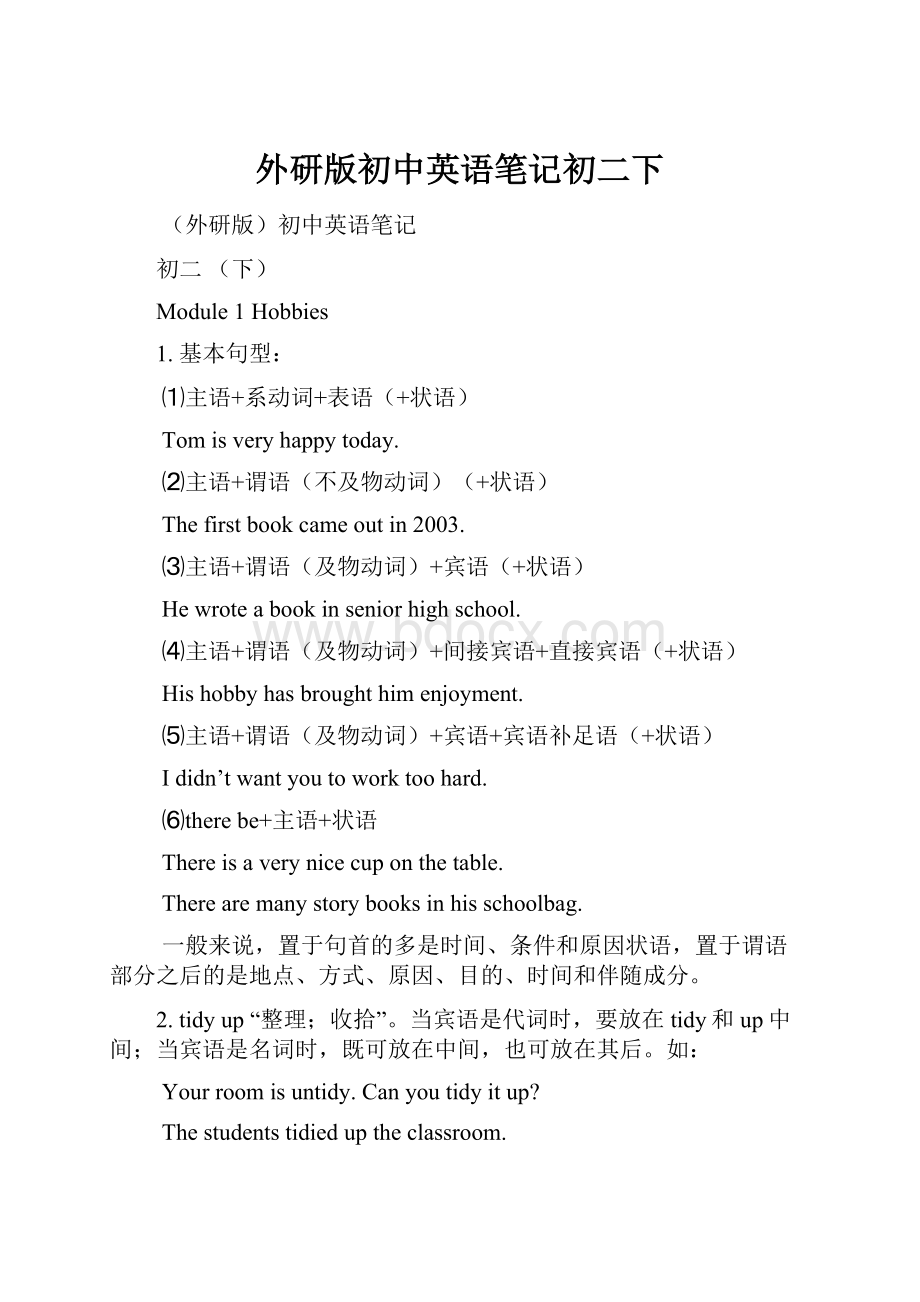外研版初中英语笔记初二下.docx
《外研版初中英语笔记初二下.docx》由会员分享,可在线阅读,更多相关《外研版初中英语笔记初二下.docx(23页珍藏版)》请在冰豆网上搜索。

外研版初中英语笔记初二下
(外研版)初中英语笔记
初二(下)
Module1Hobbies
1.基本句型:
⑴主语+系动词+表语(+状语)
Tomisveryhappytoday.
⑵主语+谓语(不及物动词)(+状语)
Thefirstbookcameoutin2003.
⑶主语+谓语(及物动词)+宾语(+状语)
Hewroteabookinseniorhighschool.
⑷主语+谓语(及物动词)+间接宾语+直接宾语(+状语)
Hishobbyhasbroughthimenjoyment.
⑸主语+谓语(及物动词)+宾语+宾语补足语(+状语)
Ididn’twantyoutoworktoohard.
⑹therebe+主语+状语
Thereisaverynicecuponthetable.
Therearemanystorybooksinhisschoolbag.
一般来说,置于句首的多是时间、条件和原因状语,置于谓语部分之后的是地点、方式、原因、目的、时间和伴随成分。
2.tidyup“整理;收拾”。
当宾语是代词时,要放在tidy和up中间;当宾语是名词时,既可放在中间,也可放在其后。
如:
Yourroomisuntidy.Canyoutidyitup?
Thestudentstidieduptheclassroom.
(类似的还有turnon,turnoff,puton,writedown等动词+副词形式)
3.listentosb.dosth.听见某人做某事。
Ioftenlistentohimplaytheviolin.
(类似于see,hear等后面可以接不带to的动词不定式)
4.当play后面接表示乐器的名词时,需要在该名词前加上定冠词the;
如:
playthepiano,playtheflute(笛子)
当play后面接表示球类的名词时,该名词前不接任何冠词。
如:
playbasketball,playfootball
5.aswellas“也;还;并且”
AaswellasB(强调A而不是B),如:
Sheiscleveraswellaspretty.
WeallwanttovisitBeijingaswellasShanghai.
6.comeout“出版;出现;(秘密等)传出;结果是”
7.asaresult“结果”,相当于so,前者用逗号隔开,后者反之。
Hehadsomebadmeat.Asaresult,hefeltill.
asaresultof“因为……”
8.collectv.收集;
collectorn.收集者
haveacollectionof…“收集……”
如:
Ihaveacollectofdolls.
9.takeup占用(时间、空间)
Thejobtakesupallmytime.
Thebigdesktakesuptoomuchspace.
10.attheendof在……末尾
11.⑴sth.+happen+时间/地点“某时(某地)发生了某事
ThestoryhappenedinBeijingin2008.
⑵sth.happentosb.“某人出了某事(常指不好的)”
Acaraccidenthappenedtoherthismorning.
⑶sb.happentodosth.或Ithappens/happensthat…某人碰巧做某事。
Ihappenedtomeetafriendofmineinthestreetyesterday.
Module2Friendship
1.宾语从句(即放在动词后面作宾语的句子):
㈠宾语从句的三要素:
引导词:
that,if/whether,疑问词
语序:
陈述语序(较特殊的如:
Heaskedmewhatwasthematter.)
时态:
①主句的时态是现在时,从句可用任意所需时态。
如:
Pleasetelluswhereheis.
②主句的时态是过去式,从句要用相应的过去式。
如:
Hetoldmethathewastired.
③从句叙说普遍真理或客观规律时,则用一般现在时。
如:
Theteachertoldusthattheearthgoesaroundthesun.
原句式
宾语从句
一般现在时
一般过去时
现在进行时(am,is,are+v.-ing)
过去进行时(was,were+v.-ing)
现在完成时(have/has+过去分词)
过去完成时(had+过去分词)
一般将来时(will+动词原形/
am,is,aregoingto+v.)
过去将来时(would+动词原形/
was,weregoingto+v.)
㈡that引导的宾语从句:
(多数可省略)
谓语动词表肯定概念,接that引导的从句的谓语动词不可有疑问的含义,多是表示观点、看法、意念、要求等方面概念的词,
如:
believe,feel,hear,hope,expect,explain,prefer,promise,report,say,see,tell,think,understand,wish,warn等。
Bettythinks(that)treesimprovetheair.
Ihopethatitwillbesnowthiswinter.
㈢whether/if引导的宾语从句:
原句式为一般疑问句时就用whether/if“是否”,常表达不确定概念。
如:
Heaskswhether/ifwewillgofishingonSunday.
whether与if一般可通用,但以下情况只用whether:
★和ornot连用:
Idon’tknowwhetherhewillcomeornot.
★动词不定式前:
Hedidn’tknowwhethertostayornot.
★介词后:
I’mnotinterestedinwhethershewillgoshopping.
★宾语从句位于句首;
★带有discuss(讨论)、decided(决定)、doubt(怀疑)等词。
㈣疑问词引导的宾语从句:
(who,when,where,what,why,how…)
注:
在疑问词引导的宾语从句中,一定要用陈述句语序。
Heaskshowwecanhelpprotecttheenvironment.
Theyhaven’tdecidedwheretheyshouldgofortheholiday.
2.acoupleof“一些,几个”;
Theywillbebackinacoupleofweeks.
acoupleof作主语时,谓语动词用单数:
Thereisacoupleofboyswaitingforyou.
3.daybyday“一天比一天地;每天;日益”,指不断发生变化的。
Hegrewstrongerdaybyday.
dayafterday“一天天地”,指不断重复的。
4.①rememberdoingsth.记得曾经做过某事。
Iremembermeetingheratapartyonce.
②remembertodosth.记住要去做某事。
Remembertoclosethewindowsbeforeyougoout.
5.find+复合宾语
⑴find+宾语+名词
Theteacherfindsthegirlagoodsinger.
⑵find+宾语+形容词
IfindEnglishgrammarverydifficult.
⑶find+it+宾语补足语+动词不定式
Hefounditveryhardtoanswerthequestion.
⑷find+宾语+介词短语(或过去分词,现在分词)
Ifoundthecatunderthebed.
6.goodluckwithsth.
goodlucktosb.
7.bytheway顺便说
intheway挡路;妨碍
onone’sway/ontheway在路上
8.worryabout=beworriedabout“担心……”
Don’tworryaboutme.Iamnotachildanymoer.
9.①faraway“遥远的”,在句中做表语、状语和后置定语。
(be)farawayfrom远离……
Theschoolfarawayfrommyhome.
②faraway“遥远的”,可做名词的前置定语。
Helivesinafarawayvillage.
10.lonely“孤独的”,指心理感受;alone独单;独自(无旁人)
I’mnotlonelythoughIamalone.
11.makefriendswith与……交朋友
12.becloseto离……近
Module3ontheradio
1.to+v.与v.-ing作宾语:
一般来说,不定式表示将来的动作或行为,而v.-ing形式表示经常性的、一般性的动作或行为及正在进行的动作或行为。
只接to+v.的
只接v.-ing的
接to或v.-ing的
want,hope,wish,
decide,expect,plan,
agree,promise…
enjoy,finish,mind,
practice,keepon…
like,love,begin,start,continue,hate.
(以上意义差别不大)
try,mean,remember,
forget,stop…(以上意义差别大)
2.答谢时常用的表达方式:
Don’tmentionit.Notatall.
You’rewelcome.That’sallright.
It’smypleasure.
3.①lookout=watchout=becareful“小心;当心”
②lookoutforsb./sth.“留心某人或某物”。
.
Lookoutforsnake!
③lookoutof向外看;lookdown向下看;lookup向上看。
4.needtodosth.需要做某事。
WeneedtospeakEnglishwell.
needdoingsth.=stn.needtobedone.某物需要……
Herroomneedstobecleaned.
5.keepdoingsth.一直做某事;继续做某事。
Theykepttalkingaboutit.
6.①preparesth.准备某物。
Motherwaspreparingdinnerinthekitchen.
②prepareforsth.=getreadyfor为……做准备
③preparetodosth.准备做某事
7.①explainsth.tosb.向某人解释某物
Theteacherexplainedtheproblemtoclass.
②explain+从句
Heexplainedwhyhewaslateforschool.
8.seem做连系动词,“似乎;好像;看起来”
①seem+名词。
Lucyseemsaveryclevergirl.
②seem+形容词。
Heseemsquitehappy.
③seem+动词不定式。
Themanseemedtobeill.
④seem+介词短语。
Theyseeminhighspirits.
⑤itseems+that从句=sb.seemstodosth.
Itseemsthatshe’sright.
⑥itseems(ed)+asif/asthough从句
Itseemsasifit’sgoingtorain.
9.①noise噪音;吵闹声
Don’tmakeanynoiseinclass.
②voice“声音,噪声”,多指人的声音。
Thesinger’svoiceissosweet.
③sound“声音;声响”,大自然的声音(人声,鸟声,机器轰鸣)
Thestorysoundsinteresting.
Module4Newtechnology
1.if从句㈠㈡∶
if引导的条件状语从句表示“如果”。
⑴if从句+祈使句:
if从句用一般现在时,祈使句的谓语动词用动词原形;if从句可以放在主句之前,也可以放在主句之后。
如:
Ifyouwanttogo,pleasetellme.
Lookatourwebsiteifthecameradoesnotwork.
⑵if从句+陈述句:
if从句中用一般现在时,表示将来的一种条件,从句中可以加时间状语;当if表将来条件时,主句用一般将来时,从句用一般现在时。
Ifitdoesn’traintomorrow,we’llgototheGreatWall.
IfIplaygamesonit,itwillgowrong.
2.connect“连接”
connectsth.to/with…如:
Couldyouconnecttheprintertothecomputer?
3.“bite(hit)sb.on/inthe+身体部位名词”,表示咬(打)某人某部位。
一般柔软多肉的部位用in,如:
face,leg,stomach,eye;
一般坚硬结实的部位用on,如:
foot,hand,head,nose,shoulder。
Theyhithimonthehead.
4.⑴lendsb.sth.=lendsth.tosb.把某物借给某人;
BettylentherMP3playertoMars.
⑵borrow…from…借入;
Allenborrowed¥2000fromherparentsyesterday.
⑶keep—kept—kept,借多久,是延续性动词,可与时间段连用。
Hehaskeptthebookfortwoweeks.
5.saveone’slife“挽救某人的生命”
Thedoctorssavedthatboy’slife.
Thedoctorssavedpeople’slives.
6.①be/getreadyforsth.为某事做好准备。
②be/getreadytodosth.乐于/愿意去做某事。
Heisalwaysreadytohelpothers.
Module5Problems
1.①ratherthan“是……而不是……”“与其……不如……”
RatherIthanyouamthewinner.
而我比你是胜利者。
YouratherthanIaregoingtocamping.
是你而不是我要去要野营。
②ratherAthanB“B肯定不会做A将要做的事”如:
Ratheryouthanme!
你行,我可不行!
③wouldrather(do)than(do)或would(do)ratherthan(do)
“宁愿……而不愿”。
如:
IwouldratherwatchTVathomethangotothepark.
Thechildrenwouldwalkthereratherthantakeabus.
④preferdoingsth.todoingsth.“宁愿……而不愿”。
2.①warnsb.about提醒/警告某人注意某人某事。
Hewarnedmeaboutpickpockets.
②warnsb.(not)todosth.提醒/警告某人(不要)做某事。
WewarnedTonynottodrivesofast.
3.口语中表示“真遗憾!
/多可惜啊!
”,如:
It’sasham./That’sasham./whatasham(pity).
4.(be)proudof“以……为荣;为……感到自豪”
Jackisveryproudhismodelplane.
5.gowrong出毛病;出故障;出错
6.beangrywithsb.生某人的气
7.atleast至少
8.beat和win“赢”
①beat—beat—beaten“击败”,后接人sb.,团队team,国家anation。
IbelieveJokewillbeatalltherunners.
②win后接事物,比赛、奖项、战争……
Wewonthegame.
9.refusetodosth.拒绝做某事。
Thesingerrefusedtosingtotherichwoman.
10.①such形容词“如此;这样”,后接名词。
如:
such(beautiful)flowers
②so副词“如此地;这么”,后接形容词或其他副词
如:
solovelyaplace,sohappy
③such和so后接单数可数名词时,词序不同:
so+adj.+a(an)+n./such+a(an)+adj.+n.
如:
soniceacoat=suchanicecoat
④后接名词复数或不可数名词时,只用such。
但后有much,little,few等修饰时,只用so.
11.“特殊疑问词+动词不定式”构成不定式短语,可做主语、宾语、表语等。
Whentoholdthemeetinghasnotyetbeendecided.
Doyouknowhowtoplaybridge?
ThequestionishowtolearnEnglishwell.
12.辨析:
⑴another“(不定数目中的)另一个,再一个”
Mycellphoneisold.Myfatherbuysanothercellphoneforme.
⑵otheradj.“别的”,泛指其余的人或物,后接可数名词的单复数。
如:
otherpeople.
⑶theother(两个中的)一个……另一个…….,
常见形式:
one…theother…如:
Mr.Luhastwosons.Oneisteacher,theotherisanurse.
⑷othersn.泛指其余的人或物,其后不接可数名词单复数。
与some对比使用时,意为“有些”。
如:
Someworkhard,othersdon’t.
⑸theothers“其余所有的”,表示在某一范围内的其他全部。
Thereare30studentsinourclass,20passedtheexam,andtheothersallfailed.
13.辨析:
①sometimes=fromtimetotime“有时”,频度副词
②sometimes“几倍;几次”
③sometime“一段时间”,常与for连用。
Ittakessb.sometimetodosth.
④sometime“不确定的时间”,可用于将来时或过去时。
⑤oneday“总有一天”,用于将来时
Module6Entertainment
1.直接引语和间接引语的转变⑴:
㈠一般现在时的陈述句转述,间接引语多数用that的宾语从句表示;如:
Hesaid(that)itwastimeforlunch.
㈡人称要随主语做适当变化。
口诀如下:
一随主,二随宾,第三人称不更新。
(解释:
①直接引语中的主语为第一人称,变为间接引语是人称要随句子主语的人称而变化;②直接引语的主语(或宾语)是第二人称时,间接引语的人称要和主句的宾语一致;③直接引语的主语(或宾语)是第三人称时,间接引语的人称不变化)。
如:
Tomsaid,“Ilikeapples.”→Tomsaidhelikedapples.
BobsaidtoKate,“Youaremygoodfriend.”→
BobsaidtoKateshewashisgoodfriend.
㈢谓语动词时态的变化:
如果引述动词为一般过去时,间接引语中动词的时态一般推移到过去时间。
直接引语
间接引语
一般现在时
一般过去时
一般将来时
过去将来时
现在进行时
过去进行时
一般过去时
过去完成时
现在完成时
过去完成时
过去完成时
过去完成时
如:
Tonysaid,“Itisanexcitingfilm.”→Tonysaid(that)itwasanexcitingfilm.
㈣其他变化:
指示代词
时间状语
地点状语
动词
this→that
now→then
here→there
come→go
these→those
today→thatday
overhere→overthere